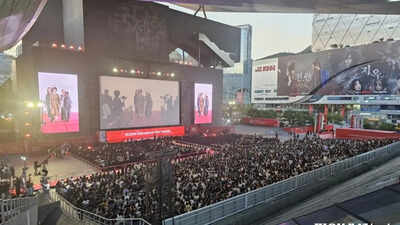ARTICLE AD BOX

29th Busan International Film Festival
A symbolic anniversary under uncertain circumstances
The
Busan International Film Festival
(BIFF), South Korea's most influential cinematic event, turns 30 this year - a milestone coinciding with a moment of uncertainty in the national film industry. When it opens on September 17, the festival will present 328 films, including 241 official selections, marking its largest lineup to date. The expansion, while celebratory, reflects more than ambition; it represents an effort to reaffirm relevance at a time when domestic cinema faces declining box office performance and waning influence in global distribution. Festival organizers have also increased screening venues, adding IMAX and university theaters across Busan to improve accessibility. The scale suggests strategic intent: BIFF aims not only to commemorate its history but also to project resilience in the face of an industry struggling to redefine itself after years of fragmentation and market shifts.
A high-profile opening underscores ambition
The choice of opening film signals the tone. Park Chan-wook's 'I Can't Help It', adapted from Donald Westlake's novel 'The Ax', portrays a laid-off worker navigating survival in contemporary Korea. With Lee Byung-hun in the lead, the story resonates with themes of labor and social struggle - effectively mirroring the broader anxieties of
Korean cinema
, which has seen challenges in connecting with domestic audiences in recent years. By positioning such a film at the forefront, BIFF underlines its role not just as a showcase of glamour but as a platform of cultural commentary. The selection seems carefully aligned with the festival's broader intent: to reassert the relevance of Korean stories within a globalized marketplace.
Expanding awards
A significant development is the introduction of the new 'Busan Award' competition, highlighting 14 key Asian works across five categories including Best Film, Director, and Artistic Contribution. This marks BIFF's first move into full-scale competitive recognition in its three decades, signaling a transition from being primarily a showcase to positioning itself among the world's peer festivals such as Cannes or Venice. Other tributes further reinforce its ambition. Iranian director
Jafar Panahi
is honored with the
Asian Filmmaker of the Year
award, while Korea's Jung Ji-young and Hong Kong's Sylvia Chang receive lifetime contributions. These selections, while celebratory, also reflect BIFF's long-standing diplomatic role in bridging Korean, Asian, and international cinematic discourses.
An assembly of global cinematic capital
The festival has secured the attendance of both established auteurs and emerging cinematic powers. Directors like Jia Zhangke, Johnnie To, Tsai Ming-liang, Lee Chang-dong, and Guillermo del Toro will converge on Busan, alongside Hollywood names Michael Mann and Sean Baker. On the acting side, Japanese icons Ken Watanabe and Hidetoshi Nishijima join Hong Kong legend Tony Leung and Taiwanese stars Shu Qi and Greg Hsu. Such a lineup positions BIFF as one of the most globally interconnected festivals in its history. Yet the high-profile guests are not only a matter of prestige - their presence underscores BIFF's attempt to situate itself as the central Asian hub in the increasingly crowded map of international film festivals.
Seeking renewal in the face of systemic challenges
Beyond celebration, there is a clear acknowledgement of tension. As Executive Director Jeong Han-seok admitted, Korean cinema is at a crossroads. Domestic market contraction, rising production costs, and shifting audience behaviors have left the industry searching for renewal. BIFF's expansion - from the enlarged "Icons" section to the internationalized "Vision" slate for emerging directors - seems to serve as both a symbolic and practical intervention.



.png)
.png)
.png)
















 3 hours ago
3
3 hours ago
3








 English (US) ·
English (US) ·